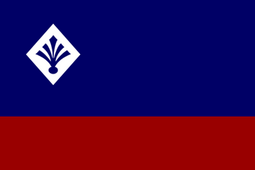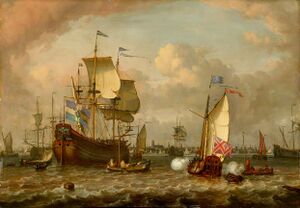Flag of Orioni: Difference between revisions
(Created page with "{{Infobox flag |Name = Orioni |Type = National |Image = Flag_of_Orioni.png |Nickname = ''Ilibati'' |Use = 110000 |Proportion = 3:2 |Adoption = 1175 |Design = Two horizonta...") |
m (→Colonial flags) |
||
| Line 194: | Line 194: | ||
[[Category:Europa]] | [[Category:Europa]] | ||
[[Category:Flags]] | [[Category:Flags]] | ||
[[Category:Flags_of_Orioni]] | |||
Revision as of 23:14, 19 March 2019
 | |
| Name | Ilibati |
|---|---|
| Use | Civil and state flag |
| Proportion | 3:2 |
| Adopted | 1175 |
| Design | Two horizontal blue (top) and red bands charged with a white diamond shield at the canton |
The national flag of Orioni (Orinese: Ilibati) is a symbol of the Orioni Empire that inherits a historical tradition of using national symbols and is an attribute of the imperial government and executive powers.
National flag
The flag features two horizontal blue (top) and red bands charged with a white diamond shield at the canton. As the colour of the sky and water, blue symbolizes calm, reflection, and the intellect. It is also the infinite, and the void from which all life develops. Ground lapis lazuli produced a pigment highly prized in Orioni for decorating temple ceilings The colour signified divine favour. Red is the colour of life, of blood, fire, passion, and war. It is worn by brides in the Orient as a symbol of good luck and fertility. Orinese calendars marked holy days in red, hence red-letter days. But red is also the colour of danger and warning signs are often marked in red. White symbolizes purity and perfection, also the Absolute. It is the colour most associated with sacredness; sacrificial animals are often white. In the Occidental world brides usually wear white, but it is the colour of mourning in much of the Orient. Ghosts are thought to be white because it is a colour that conceals nothing. A white flag signals truce, and therefore peace.
| Colour scheme | White | Blue | Red |
|---|---|---|---|
| Pantone | Safe | Blue 276 | Red 1807 |
| CMYK | 0.0.0.0 | 99.100.0.60 | 0.100.100.34 |
| RGB | (255,255,255) | (1,0,103) | (169,0,0) |
| HEX web colour | #FFFFFF | #010067 | #A90000 |
The diamond shape is an early Oharic representation of a heart or womb, dating from circa 3000 BCE. Large numbers of representational clay tablets have been unearthed in modern Andro and Sirius. Some 1500 different symbols have been decoded, most of them relating to agricultural and commercial matters. The most prized as well as the hardest stone, the diamond is also associated with incorruptibility and invincibility. Its transparency and purity make it also a symbol of constancy and sincerity. In heraldry, the diamond is called lozenge. A lozenge-shaped escutcheon is used to depict heraldry for a female, but is also sometimes used as a shape for mural monuments in churches which commemorate females. Traditionally very limited categories of females have been able to display their own arms, for example, a female monarch. This in contrast to the escutcheon or shield for men, which is in its origin an object of warfare. In some other cultures, the diamond is rounded to an almond-shape. Also known as the mandorla, the almond-shaped halo is formed from two intersecting circles It is used to symbolize the individual's ascension to heaven.
The coat of arms is a shield with the image of a stylised cedar tree branch, Orioni's imperial symbol. Presence and position of the tree on the shield is directly inspired by the Orioni cedar (Cedrus orioni). The Cedar is a symbol of holiness, eternity and peace. The tree has symbolic significance in cultures throughout the world. A reverence for trees, and even tree worship is widespread throughout the world. It represents the Great Mother in her nourishing, sheltering form. Many traditions speak of a tree of life: a tree that is the central point and pivot of the world. Rooted in the earth, it draws water from the ground and reaches up to the heavens and eternity, acting as a world axis. It is closely linked to the symbolism of the pillar and the mountain. As an emblem of longevity, the cedar of Orioni has its origin in many liturgical or apocryphal references.
Variants
- Civil ensign
- Naval ensign and jack
- Royal standard
- Mourning
Sub-national flags
Military flags
| Flag | Date | Use |
|---|---|---|

|
1381-present | Flag of the Orioni army. |

|
Year-present | Flag of the Orioni navy. |

|
1915-present | Flag of the Orioni air force. |
Historical flags
- Pre-dynastic
- Queendom
- First Empire
- Civil war flag
- Restored Empire
Colonial flags
| Flag | Date | Use |
|---|---|---|

|
1XXX-19XX | Former flag of Astrini island, present-day Niederoestereich. |

|
1XXX-1843 | Former flag of the Baribeni islands, present-day Bainbridge Islands. |

|
1XXX-19XX | Flag of Burkini island, northwest of the Sunset Sea Islands. |

|
1XXX-19XX | Flag of Rohini island, northeast of Orioni, in the North Oriental Ocean. |

|
1XXX-1XXX | Flag of Tahini island. |

|
1XXX-1XXX | Flag of Thubani island, north of Orioni, in the Rosario Sea. |
Inspiration: http://iiwiki.com/wiki/Flag_of_Midrasia



















